The following is a list of military officers who have led divisions of a civil service.
Brigadier-General (Ret) Gordon O'Connor, Minister of National Revenue 2007-
A serving military officer, without special authorization, cannot be Secretary of State or Defense. Special circumstances existed for George Marshall, as a five-star General of the Army (GOA). Five-star ranks, which have not been used since shortly after World War II, technically never retire. The National Security Act of 1947 allows either the Director or Vice Director of Central Intelligence to be a serving officer, but not both.

The National War College (NWC) of the United States is a school in the National Defense University. It is housed in Roosevelt Hall on Fort Lesley J. McNair, Washington, D.C., the third-oldest Army post still active.
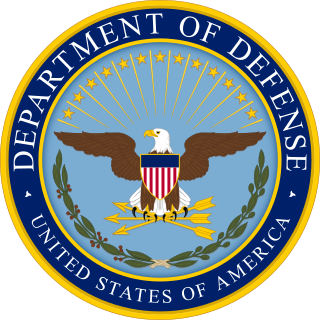
The United States secretary of defense (SecDef) is the head of the United States Department of Defense, the executive department of the U.S. Armed Forces, and is a high-ranking member of the federal cabinet. The secretary of defense's position of command and authority over the military is second only to that of the president of the United States, who is the commander-in-chief. This position corresponds to what is generally known as a defense minister in many other countries. The secretary of defense is appointed by the president with the advice and consent of the Senate, and is by custom a member of the Cabinet and by law a member of the National Security Council.

George Grunert was a United States Army cavalry officer who worked his way up through the ranks from private to retirement as a lieutenant general. His 47-year career extended from the Spanish–American War to the end of World War II.

Omar Nelson Bradley was a senior officer of the United States Army during and after World War II, rising to the rank of General of the Army. He was the first chairman of the Joint Chiefs of Staff and oversaw the U.S. military's policy-making in the Korean War.
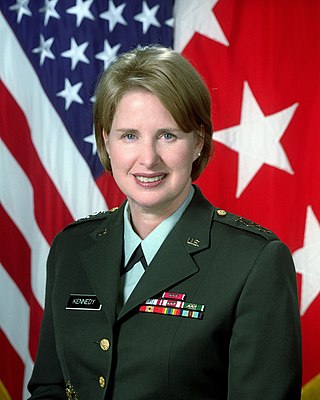
Claudia Jean Kennedy is a retired lieutenant general in the United States Army. She is the first woman to reach the rank of three-star general in the United States Army. She retired in 2000 after 31 years of military service.

General Walter Bedell "Beetle" Smith was a senior officer of the United States Army who served as General Dwight D. Eisenhower's chief of staff at Allied Forces Headquarters (AFHQ) during the Tunisia Campaign and the Allied invasion of Italy in 1943, during World War II. He was Eisenhower's chief of staff at the Supreme Headquarters Allied Expeditionary Force (SHAEF) in the campaign in Western Europe from 1944 to 1945.
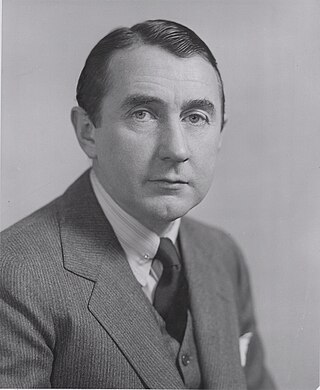
William Harding Jackson was a U.S. civilian administrator, New York lawyer, and investment banker who served as Deputy Director of the Central Intelligence Agency. Jackson also served briefly under President Dwight D. Eisenhower as Acting United States National Security Advisor from 1956 to 1957.
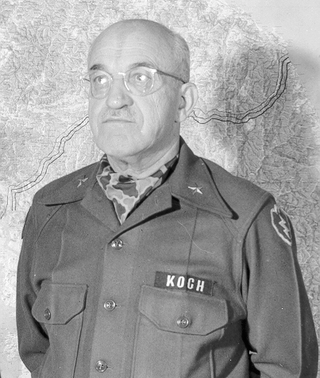
Oscar W. Koch was a brigadier general in the United States Army. He was most notable for his service as Third Army's Intelligence officer (G-2) under General George S. Patton in World War II.

Lieutenant General Samuel Vaughan Wilson, aka "General Sam," completed his active military career in the fall of 1977, having divided his service almost equally between special operations and intelligence assignments.
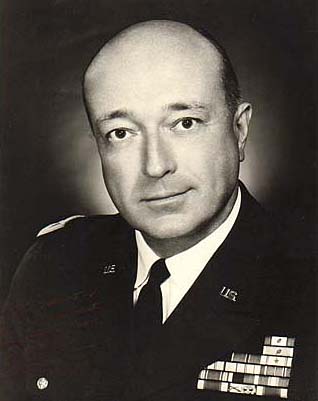
Marshall Sylvester Carter was a lieutenant general in the United States Army. From 1965 to 1969, he served as Director of the National Security Agency.

The Air Force Institute of Technology (AFIT) is a postgraduate institution and provider of professional and continuing education for the United States Armed Forces and is part of the United States Air Force. It is in Ohio at Wright-Patterson Air Force Base, near Dayton. AFIT is a component of the Air University and Air Education and Training Command.
In the United States military, a general is the most senior general-grade officer; it is the highest achievable commissioned officer rank that may be attained in the United States Armed Forces, with exception of the Navy and Coast Guard, which have the equivalent rank of admiral instead. The official and formal insignia of "general" is defined by its four stars.
In the United States Armed Forces, a lieutenant general is a three-star general officer in the United States Army, Marine Corps, Air Force, and Space Force.
Harris B. Hull was a brigadier general in the United States Air Force, and part of the original staff of the Eighth Air Force during the Second World War.

John Alexander Gordon was an American air force general who served as Deputy Director of the Central Intelligence Agency. He also served as the President's Homeland Security advisor from 2003 to 2004.

John Rutherford Allen is a retired United States Marine Corps four-star general, and former commander of the NATO International Security Assistance Force and U.S. Forces – Afghanistan (USFOR-A). On September 13, 2014, President Barack Obama appointed Allen as special presidential envoy for the Global Coalition to Counter ISIL. He was succeeded in that role by Brett McGurk on October 23, 2015. He is the co-author of Turning Point: Policymaking in the Era of Artificial Intelligence with Darrell M. West and Future War and the Defence of Europe alongside Lieutenant General (Ret.) Ben Hodges and Professor Julian Lindley French. Allen was president of the Brookings Institution from October 2017 until his resignation on June 12, 2022.

Edwin Kennedy Wright, also known as Pinky. was a career US Army officer and deputy director of the US Central Intelligence Agency.

Rutledge Parker "Hap" Hazzard was director of Science and Technology division of Central Intelligence Agency (CIA) from 1973 to 1978. He became director of the National Photographic Interpretation Center (NPIC) in 1978. After serving six years as director of NPIC from June 1978 to February 1984, Hazzard returned to the CIA's National Intelligence Office. He retired from public service in 1985.
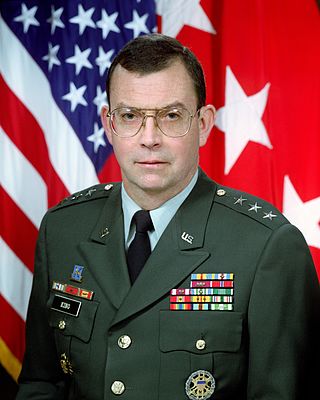
James C. King is a retired United States Army Lieutenant General. A career Military Intelligence officer, he served on active duty from 1968 to 2001. At the time of his retirement he was serving as the Director of the National Imagery and Mapping Agency, one of the intelligence agencies of the United States Intelligence Community.

Louis H. Renfrow was a Military Aide to the President (1947-1949) during the presidency of Harry S. Truman. He served as Chief Liaison and Legislative Officer, Selective Service System from 1946 to 1948. From 1949 to 1950, Renfrow served as Special Assistant to the Secretary, Department of Defense, and from 1950 to 1957 was Deputy Director, Selective Service System. He originally was a member of the Missouri National Guard, serving in the dental corps. He was a brigadier general. Renfrow was born in Cairo, Illinois.